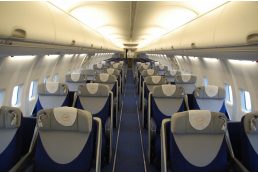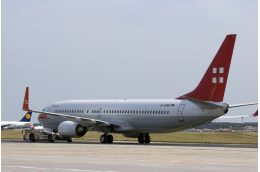Lufthansa will be the first scheduled carrier to connect Munich with Tashkent, although in the 1990s the German carrier did serve the Uzbek capital from its Frankfurt hub but pulled the route in 2001 due to a decline in demand.
Why use Privatair?
Rather than operating one of its own aircraft, Lufthansa has chosen to serve Tashkent using a leased B737-800 aircraft from Privatair that will be configured to serve the strong business market.Lufthansa existing widebodies would have too much capacity and its narrowbodies would not have the product or payload performance.
Privatair focuses on leasing out business jets to major carriers and the aircraft serving Tashkent will provide 24 seats in business class and 84 seats in economy. The aircraft that will be used on the Tashkent route is based Munich and is ideally suited to serve a long, thin route such as Germany- Uzbekistan.
The business-class will feature a lie-flat product, which should prove to be a strong selling point. Lufthansa confirmed in a recent press statement that the flight is designed to "offer all the benefits of its long-haul product".


CAPTION: Privatair's B737 awaits a lick of paint of the Lufthansa livery ahead of its launch to Tashkent. Journey time from Munich is around six hours - enough time for passengers to enjoy Lufthansa's full business-class service.
Why Tashkent?
Tashkent is one of the largest cities in Central Asia with a population of around two million. With strong business links primarily due to its gas industry, as well as a growing population and tourism links, Lufthansa expects demand to be fairly evenly split between business, leisure and ethnic traffic.
According to IATA BSP data, Munich is the fourth largest unserved market from Tashkent (Airport IS Jan 09-10). With this new link, Lufthansa will also be able to compete with Uzbekistan Airways, which operates a thrice- weekly frequency to Frankfurt.
Gudrun Gorner, Lufthansa's corporate communications executive, confirmed to Routes News that the carrier is targeting tourism and ethnic traffic on the new routing. "Germany is one of Uzbekistan's principal import partners and an important export partner. Tashkent also boasts an array of tourist attractions and is a key staging post for trips on the Silk Road."
National Carrier Dominance in Tashkent
State-owned national carrier Uzbekistan Airways operates a diverse fleet, ranging from Boeing and Airbus aircraft to Russian designed Iluyshin, Tupolev and Antonov planes.
It has tight control over the Tashkent market, dominating the route network from the hub with connections to a range of destinations. In total the carrier serves 52 destinations from Tashkent with routes across Europe and Asia, including Amritsar in India.
The data below shows the current airline capacity in Tashkent. It also highlights that 19 carriers currently operate 255 weekly scheduled flights from the airport. (Source: Flightbase: week 14-20 June).
|
Carrier |
Weekly Flights |
Destinations |
Market Share |
|
Uzbekistan Airways |
201 |
51 |
80% |
|
Korean Air |
6 |
2 |
2% |
|
Atlant-Soyuz Airlines |
6 |
1 |
2% |
|
Turkish Airlines |
5 |
1 |
2% |
|
Aeroflot |
5 |
1 |
2% |
|
Transaero Airlines |
5 |
1 |
2% |
|
airBaltic |
3 |
1 |
1% |
|
Rossiya Airlines |
3 |
1 |
1% |
|
Asiana Airlines |
3 |
1 |
1% |
|
China Southern |
3 |
1 |
1% |
|
Others |
16 |
12 |
6% |
The leading international markets from Tashkent are Moscow Domodedovo and Istanbul, with 18 and 10 weekly frequencies respectively (Flightbase: June 14-20, 2010)
How Does Lufthansa Stand to Benefit in Tashkent?
Tashkent's current network reflects strong links with Asia, as well as Moscow, which has traditionally fed much of the CIS traffic to Europe.
The new Tashkent route provides an additional source market for Lufthansa's Munich hub, with connectivity to other European points and the US.
The carrier is well positioned to feed westbound traffic through Munich, as the other European carriers operating to Tashkent - airBaltic and Turkish Airlines - have in comparison weaker westbound networks.
In Central Asia, while Uzbekistan Airways will continue to wrestle with foreign carriers to maintain supremacy at the airport, Lufthansa will be the only carrier serving Tashkent that offers an intercontinental two-class (economy and business) product.
"The aircraft type will allow Lufthansa to offer its customers a very personal service, along with rapid processing times on the ground," said Gomer.





